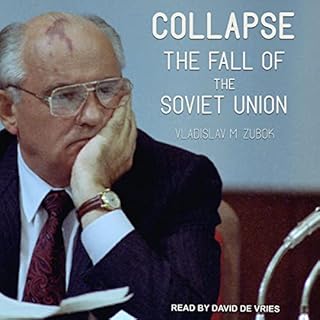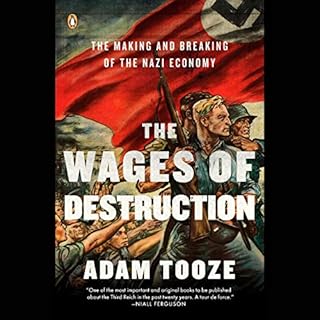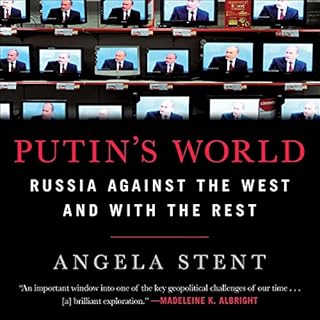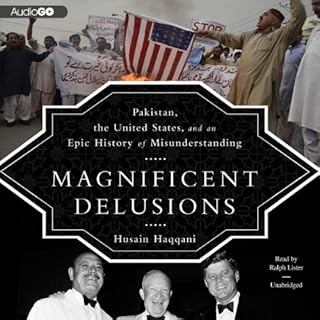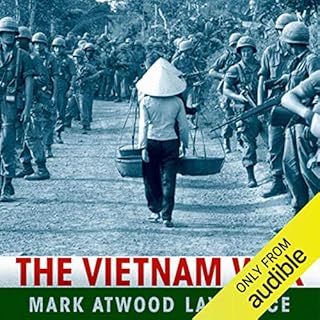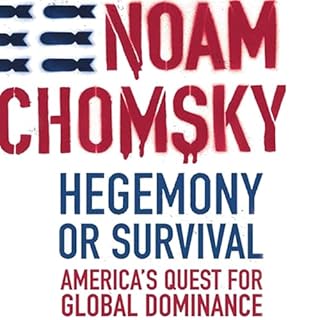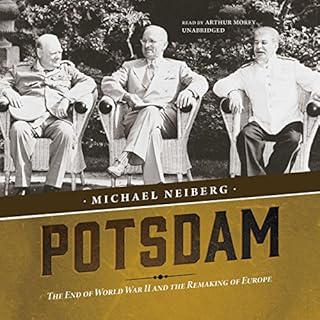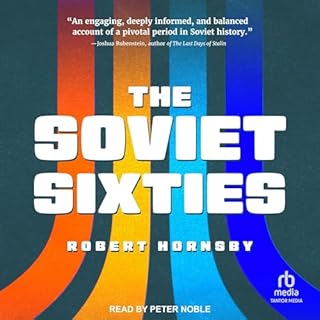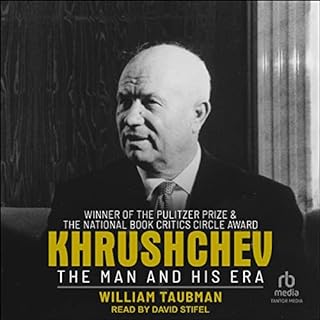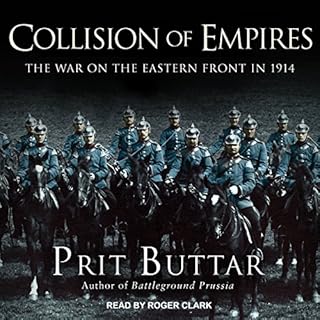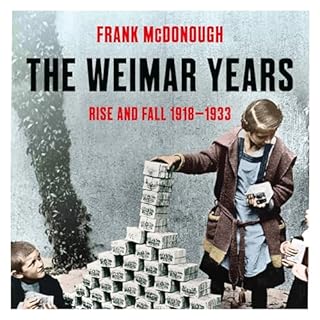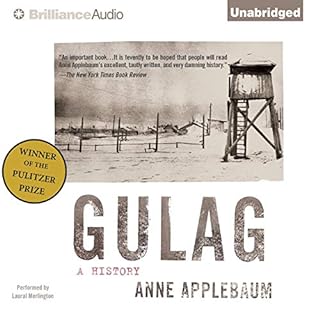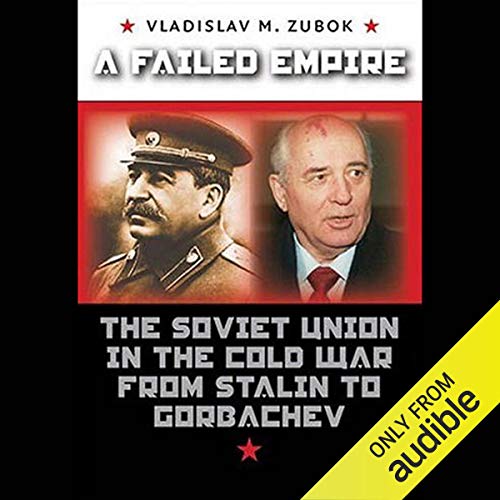
A Failed Empire
The Soviet Union in the Cold War from Stalin to Gorbachev
No se pudo agregar al carrito
Add to Cart failed.
Error al Agregar a Lista de Deseos.
Error al eliminar de la lista de deseos.
Error al añadir a tu biblioteca
Error al seguir el podcast
Error al dejar de seguir el podcast
 Exclusivo para miembros Prime: ¿Nuevo en Audible? Obtén 2 audiolibros gratis con tu prueba.
Exclusivo para miembros Prime: ¿Nuevo en Audible? Obtén 2 audiolibros gratis con tu prueba.Compra ahora por $39.95
No default payment method selected.
We are sorry. We are not allowed to sell this product with the selected payment method
-
Narrado por:
-
Nick Sullivan
-
De:
-
Vladimir Zubok
Acerca de esta escucha
Western interpretations of the Cold War - both realist and neoconservative - have erred by exaggerating either the Kremlin's pragmatism or its aggressiveness, argues Vladislav Zubok. Explaining the interests, aspirations, illusions, fears, and misperceptions of the Kremlin leaders and Soviet elites, Zubok offers a Soviet perspective on the greatest standoff of the 20th century.
©2007 Vladislav M. Zubok (P)2010 Audible, Inc.Los oyentes también disfrutaron...
-
Collapse
- The Fall of the Soviet Union
- De: Vladislav M. Zubok
- Narrado por: David de Vries
- Duración: 23 h y 50 m
- Versión completa
-
General4.5 out of 5 stars 432
-
Narración:5 out of 5 stars 372
-
Historia4.5 out of 5 stars 370
In 1945, the Soviet Union controlled half of Europe and was a founding member of the United Nations. By 1991, it had an army four million strong, 5,000 nuclear-tipped missiles, and was the second biggest producer of oil in the world. But soon afterward, the union sank into an economic crisis and was torn apart by nationalist separatism. Its collapse was one of the seismic shifts of the 20th century.
-
4 out of 5 stars
-
Hopefully Not Prescient
- De Joshua en 01-29-22
-
Jack Benny: Planes, Trains & Automobiles
- De: Original Radio Broadcast
- Narrado por: Jack Benny, Mary Livingstone, Eddie "Rochester" Anderson, y otros
- Duración: 7 h y 41 m
- Grabación Original
-
General5 out of 5 stars 25
-
Narración:5 out of 5 stars 22
-
Historia5 out of 5 stars 22
Hit the road, Jack! Take a train, a plane, or even a ship! Wherever he goes, and however he gets there, Jack Benny is always good for a laugh. Mary Livingstone, Phil Harris, Eddie “Rochester” Anderson, Dennis Day, and Don Wilson come along for the ride in 16 travel themed adventures in this collection. Climb aboard for coast to coast clowning, with special appearances by the infamous racetrack “tout” (Sheldon Leonard) and the reliable railway announcer (Mel Blanc). “Train leaving on track five for Anaheim, Azusa, and Cuc-amonga!”
-
5 out of 5 stars
-
Cigarette commercials are evil.
- De Chris Coyne en 07-22-20
-
The Thirty Years War
- Europe's Tragedy
- De: Peter H. Wilson
- Narrado por: Matthew Waterson
- Duración: 33 h y 25 m
- Versión completa
-
General4.5 out of 5 stars 151
-
Narración:4.5 out of 5 stars 126
-
Historia4.5 out of 5 stars 126
The Thirty Years War devastated seventeenth-century Europe, killing nearly a quarter of all Germans and laying waste to towns and countryside alike. Peter Wilson offers the first new history in a generation of a horrifying conflict that transformed the map of the modern world.
-
3 out of 5 stars
-
Less caffeine, narrator
- De Jeff Joyner en 02-12-24
De: Peter H. Wilson
-
Russia at War, 1941–1945
- A History
- De: Alexander Werth, Nicolas Werth - foreword
- Narrado por: Derek Perkins
- Duración: 38 h y 27 m
- Versión completa
-
General5 out of 5 stars 94
-
Narración:5 out of 5 stars 85
-
Historia5 out of 5 stars 84
In 1941, Russian-born British journalist Alexander Werth observed the unfolding of the Soviet-German conflict with his own eyes. What followed was the widely acclaimed book, Russia at War, first printed in 1964. At once a history of facts, a collection of interviews, and a document of the human condition, Russia at War is a stunning, modern classic that chronicles the savagery and struggles on Russian soil during the most incredible military conflict in modern history.
-
5 out of 5 stars
-
Simply Astonishing
- De Nicholas Robinson en 02-28-22
De: Alexander Werth, y otros
-
Iron Curtain
- The Crushing of Eastern Europe, 1944-1956
- De: Anne Applebaum
- Narrado por: Cassandra Campbell
- Duración: 26 h y 39 m
- Versión completa
-
General4.5 out of 5 stars 631
-
Narración:4.5 out of 5 stars 543
-
Historia4.5 out of 5 stars 539
At the end of World War II, the Soviet Union to its surprise and delight found itself in control of a huge swath of territory in Eastern Europe. Stalin and his secret police set out to convert a dozen radically different countries to Communism, a completely new political and moral system. In Iron Curtain, Pulitzer Prize-winning journalist Anne Applebaum describes how the Communist regimes of Eastern Europe were created and what daily life was like once they were complete.
-
4 out of 5 stars
-
Important story, imperfectly executed
- De jackifus en 12-08-12
De: Anne Applebaum
-
Global Crisis
- War, Climate Change, & Catastrophe in the Seventeenth Century
- De: Geoffrey Parker
- Narrado por: Peter Noble
- Duración: 48 h y 44 m
- Versión completa
-
General4 out of 5 stars 11
-
Narración:4.5 out of 5 stars 9
-
Historia4.5 out of 5 stars 9
Revolutions, droughts, famines, invasions, wars, regicides, government collapses—the calamities of the mid-seventeenth century were unprecedented in both frequency and severity. The effects of what historians call the "General Crisis" extended from England to Japan and from the Russian Empire to sub-Saharan Africa and the Americas.
-
2 out of 5 stars
-
48 hours I'll never get back
- De J. en 06-03-23
De: Geoffrey Parker
-
Collapse
- The Fall of the Soviet Union
- De: Vladislav M. Zubok
- Narrado por: David de Vries
- Duración: 23 h y 50 m
- Versión completa
-
General4.5 out of 5 stars 432
-
Narración:5 out of 5 stars 372
-
Historia4.5 out of 5 stars 370
In 1945, the Soviet Union controlled half of Europe and was a founding member of the United Nations. By 1991, it had an army four million strong, 5,000 nuclear-tipped missiles, and was the second biggest producer of oil in the world. But soon afterward, the union sank into an economic crisis and was torn apart by nationalist separatism. Its collapse was one of the seismic shifts of the 20th century.
-
4 out of 5 stars
-
Hopefully Not Prescient
- De Joshua en 01-29-22
-
Jack Benny: Planes, Trains & Automobiles
- De: Original Radio Broadcast
- Narrado por: Jack Benny, Mary Livingstone, Eddie "Rochester" Anderson, y otros
- Duración: 7 h y 41 m
- Grabación Original
-
General5 out of 5 stars 25
-
Narración:5 out of 5 stars 22
-
Historia5 out of 5 stars 22
Hit the road, Jack! Take a train, a plane, or even a ship! Wherever he goes, and however he gets there, Jack Benny is always good for a laugh. Mary Livingstone, Phil Harris, Eddie “Rochester” Anderson, Dennis Day, and Don Wilson come along for the ride in 16 travel themed adventures in this collection. Climb aboard for coast to coast clowning, with special appearances by the infamous racetrack “tout” (Sheldon Leonard) and the reliable railway announcer (Mel Blanc). “Train leaving on track five for Anaheim, Azusa, and Cuc-amonga!”
-
5 out of 5 stars
-
Cigarette commercials are evil.
- De Chris Coyne en 07-22-20
-
The Thirty Years War
- Europe's Tragedy
- De: Peter H. Wilson
- Narrado por: Matthew Waterson
- Duración: 33 h y 25 m
- Versión completa
-
General4.5 out of 5 stars 151
-
Narración:4.5 out of 5 stars 126
-
Historia4.5 out of 5 stars 126
The Thirty Years War devastated seventeenth-century Europe, killing nearly a quarter of all Germans and laying waste to towns and countryside alike. Peter Wilson offers the first new history in a generation of a horrifying conflict that transformed the map of the modern world.
-
3 out of 5 stars
-
Less caffeine, narrator
- De Jeff Joyner en 02-12-24
De: Peter H. Wilson
-
Russia at War, 1941–1945
- A History
- De: Alexander Werth, Nicolas Werth - foreword
- Narrado por: Derek Perkins
- Duración: 38 h y 27 m
- Versión completa
-
General5 out of 5 stars 94
-
Narración:5 out of 5 stars 85
-
Historia5 out of 5 stars 84
In 1941, Russian-born British journalist Alexander Werth observed the unfolding of the Soviet-German conflict with his own eyes. What followed was the widely acclaimed book, Russia at War, first printed in 1964. At once a history of facts, a collection of interviews, and a document of the human condition, Russia at War is a stunning, modern classic that chronicles the savagery and struggles on Russian soil during the most incredible military conflict in modern history.
-
5 out of 5 stars
-
Simply Astonishing
- De Nicholas Robinson en 02-28-22
De: Alexander Werth, y otros
-
Iron Curtain
- The Crushing of Eastern Europe, 1944-1956
- De: Anne Applebaum
- Narrado por: Cassandra Campbell
- Duración: 26 h y 39 m
- Versión completa
-
General4.5 out of 5 stars 631
-
Narración:4.5 out of 5 stars 543
-
Historia4.5 out of 5 stars 539
At the end of World War II, the Soviet Union to its surprise and delight found itself in control of a huge swath of territory in Eastern Europe. Stalin and his secret police set out to convert a dozen radically different countries to Communism, a completely new political and moral system. In Iron Curtain, Pulitzer Prize-winning journalist Anne Applebaum describes how the Communist regimes of Eastern Europe were created and what daily life was like once they were complete.
-
4 out of 5 stars
-
Important story, imperfectly executed
- De jackifus en 12-08-12
De: Anne Applebaum
-
Global Crisis
- War, Climate Change, & Catastrophe in the Seventeenth Century
- De: Geoffrey Parker
- Narrado por: Peter Noble
- Duración: 48 h y 44 m
- Versión completa
-
General4 out of 5 stars 11
-
Narración:4.5 out of 5 stars 9
-
Historia4.5 out of 5 stars 9
Revolutions, droughts, famines, invasions, wars, regicides, government collapses—the calamities of the mid-seventeenth century were unprecedented in both frequency and severity. The effects of what historians call the "General Crisis" extended from England to Japan and from the Russian Empire to sub-Saharan Africa and the Americas.
-
2 out of 5 stars
-
48 hours I'll never get back
- De J. en 06-03-23
De: Geoffrey Parker
-
Stalin
- The Court of the Red Tsar
- De: Simon Sebag Montefiore
- Narrado por: Jonathan Aris
- Duración: 27 h y 50 m
- Versión completa
-
General5 out of 5 stars 1,013
-
Narración:5 out of 5 stars 861
-
Historia4.5 out of 5 stars 859
In a seamless meshing of exhaustive research, brilliant synthesis and narrative élan, Simon Sebag Montefiore chronicles the life and lives of Stalin’s court from the time of his acclamation as “leader” in 1929, five years after Lenin’s death, until his own death in 1953 at the age of 73. Through the lens of personality - Stalin’s as well as those of his most notorious henchmen, Molotov, Beria and Yezhov among them - the author sheds new light on the oligarchy that attempted to create a new world by exterminating the old.
-
5 out of 5 stars
-
Stalinist Tyranny
- De Kindle Customer en 12-28-19
-
The Wages of Destruction
- The Making and Breaking of the Nazi Economy
- De: Adam Tooze
- Narrado por: Adam Tooze, Simon Vance
- Duración: 30 h y 19 m
- Versión completa
-
General5 out of 5 stars 335
-
Narración:5 out of 5 stars 289
-
Historia5 out of 5 stars 287
An extraordinary mythology has grown up around the Third Reich that hovers over political and moral debate even today. Adam Tooze's controversial book challenges the conventional economic interpretations of that period.
-
5 out of 5 stars
-
Ties the story together in an amazing way
- De Philo en 08-23-21
De: Adam Tooze
-
A People’s Tragedy
- De: Orlando Figes
- Narrado por: Roger Davis
- Duración: 47 h y 1 m
- Versión completa
-
General4.5 out of 5 stars 627
-
Narración:5 out of 5 stars 538
-
Historia5 out of 5 stars 539
Opening with a panorama of Russian society, from the cloistered world of the Tsar to the brutal life of the peasants, A People’s Tragedy follows workers, soldiers, intellectuals and villagers as their world is consumed by revolution and then degenerates into violence and dictatorship. Drawing on vast original research, Figes conveys above all the shocking experience of the revolution for those who lived it, while providing the clearest and most cogent account of how and why it unfolded.
-
4 out of 5 stars
-
It would be 5 stars
- De Michael Polevoy en 01-31-19
De: Orlando Figes
-
The End of History and the Last Man
- De: Francis Fukuyama
- Narrado por: L. J. Ganser
- Duración: 15 h y 51 m
- Versión completa
-
General4.5 out of 5 stars 359
-
Narración:4.5 out of 5 stars 293
-
Historia4.5 out of 5 stars 287
Ever since its first publication in 1992, The End of History and the Last Man has provoked controversy and debate. Francis Fukuyama's prescient analysis of religious fundamentalism, politics, scientific progress, ethical codes, and war is as essential for a world fighting fundamentalist terrorists as it was for the end of the Cold War. Now updated with a new afterword, The End of History and the Last Man is a modern classic.
-
5 out of 5 stars
-
An important discussion expertly narrated
- De Kevin Teeple en 06-27-19
De: Francis Fukuyama
-
The Coming of the Third Reich
- De: Richard J. Evans
- Narrado por: Sean Pratt
- Duración: 21 h y 11 m
- Versión completa
-
General4.5 out of 5 stars 2,193
-
Narración:4.5 out of 5 stars 1,729
-
Historia4.5 out of 5 stars 1,729
There is no story in 20th-century history more important to understand than Hitler’s rise to power and the collapse of civilization in Nazi Germany. With The Coming of the Third Reich, Richard Evans, one of the world’s most distinguished historians, has written the definitive account for our time.
-
5 out of 5 stars
-
Compelling and depressing
- De Tad Davis en 06-30-10
De: Richard J. Evans
-
Crimea
- De: Orlando Figes
- Narrado por: Malk Williams
- Duración: 20 h y 38 m
- Versión completa
-
General4.5 out of 5 stars 519
-
Narración:4.5 out of 5 stars 454
-
Historia4.5 out of 5 stars 451
The terrible conflict that dominated the mid-19th century, the Crimean War, killed at least 800,000 men and pitted Russia against a formidable coalition of Britain, France and the Ottoman Empire. It was a war for territory, provoked by fear that if the Ottoman Empire were to collapse then Russia could control a huge swathe of land from the Balkans to the Persian Gulf. But it was also a war of religion, driven by a fervent, populist and ever more ferocious belief by the Tsar and his ministers that it was Russia's task to rule all Orthodox Christians and control the Holy Land.
-
5 out of 5 stars
-
Outstanding History of the Crimean War
- De Rick Sailor en 11-08-18
De: Orlando Figes
-
The Marshall Plan
- Dawn of the Cold War
- De: Benn Steil
- Narrado por: Arthur Morey
- Duración: 16 h y 34 m
- Versión completa
-
General4.5 out of 5 stars 386
-
Narración:4.5 out of 5 stars 345
-
Historia4.5 out of 5 stars 345
The award-winning author of The Battle of Bretton Woods reveals the gripping history behind the Marshall Plan—told with verve, insight, and resonance for today.
In the wake of World War II, with Britain’s empire collapsing and Stalin's on the rise, US officials under new secretary of state George C. Marshall set out to reconstruct western Europe as a bulwark against communist authoritarianism. Their massive, costly, and ambitious undertaking would confront Europeans and Americans alike with a vision at odds with their history and self-conceptions. In the process, they would drive the creation of NATO, the European Union, and a Western identity that continues to shape world events.
Focusing on the critical years 1947 to 1949, Benn Steil’s thrilling account brings to life the seminal episodes marking the collapse of postwar US-Soviet relations—the Prague coup, the Berlin blockade, and the division of Germany. In each case, we see and understand like never before Stalin’s determination to crush the Marshall Plan and undermine American power in Europe.
Given current echoes of the Cold War, as Putin’s Russia rattles the world order, the tenuous balance of power and uncertain order of the late 1940s is as relevant as ever. The Marshall Plan provides critical context into understanding today’s international landscape. Bringing to bear fascinating new material from American, Russian, German, and other European archives, Steil’s account will forever change how we see the Marshall Plan and the birth of the Cold War. A polished and masterly work of historical narrative, this is an instant classic of Cold War literature.
-
5 out of 5 stars
-
A Deeply Researched Narrative
- De Jean en 10-18-18
De: Benn Steil
-
Not One Inch
- America, Russia, and the Making of Post-Cold War Stalemate
- De: M.E. Sarotte
- Narrado por: Teri Schnaubelt
- Duración: 15 h y 54 m
- Versión completa
-
General4.5 out of 5 stars 217
-
Narración:4.5 out of 5 stars 186
-
Historia4.5 out of 5 stars 186
Based on over a hundred interviews and on secret records of White House-Kremlin contacts, Not One Inch shows how the United States successfully overcame Russian resistance in the 1990s to expand NATO to more than 900 million people. But it also reveals how Washington's hardball tactics transformed the era between the Cold War and the present day, undermining what could have become a lasting partnership.
-
5 out of 5 stars
-
America's NATO problem
- De Jeffrey D en 03-24-22
De: M.E. Sarotte
-
Putin's World
- Russia Against the West and with the Rest
- De: Angela Stent
- Narrado por: Kevin Stillwell
- Duración: 15 h y 32 m
- Versión completa
-
General4.5 out of 5 stars 179
-
Narración:4.5 out of 5 stars 162
-
Historia4.5 out of 5 stars 161
Putin's World examines the country's turbulent past, how it has influenced Putin, the Russians' understanding of their position on the global stage and their future ambitions—and their conviction that the West has tried to deny them a seat at the table of great powers since the USSR collapsed.
-
2 out of 5 stars
-
More like The West against the world
- De Felis N en 01-18-20
De: Angela Stent
-
Why Nations Fail
- The Origins of Power, Prosperity, and Poverty
- De: Daron Acemoglu, James A. Robinson
- Narrado por: Dan Woren
- Duración: 17 h y 55 m
- Versión completa
-
General4.5 out of 5 stars 4,511
-
Narración:4.5 out of 5 stars 3,744
-
Historia4.5 out of 5 stars 3,733
Brilliant and engagingly written, Why Nations Fail answers the question that has stumped the experts for centuries: Why are some nations rich and others poor, divided by wealth and poverty, health and sickness, food and famine?
-
4 out of 5 stars
-
Pros and Cons of "Why Nations Fail"
- De Joshua Kim en 05-01-12
De: Daron Acemoglu, y otros
-
On China
- De: Henry Kissinger
- Narrado por: Nicholas Hormann
- Duración: 20 h y 10 m
- Versión completa
-
General4.5 out of 5 stars 1,394
-
Narración:4.5 out of 5 stars 1,154
-
Historia4.5 out of 5 stars 1,147
In this sweeping and insightful history, Henry Kissinger turns for the first time at book length to a country he has known intimately for decades and whose modern relations with the West he helped shape. On China illuminates the inner workings of Chinese diplomacy during such pivotal events as the initial encounters between China and tight line modern European powers, the formation and breakdown of the Sino-Soviet alliance, the Korean War, and Richard Nixon’s historic trip to Beijing.
-
3 out of 5 stars
-
Another History of China
- De Elton en 09-23-11
De: Henry Kissinger
-
American Nations
- A History of the Eleven Rival Regional Cultures of North America
- De: Colin Woodard
- Narrado por: Walter Dixon
- Duración: 12 h y 51 m
- Versión completa
-
General4.5 out of 5 stars 3,509
-
Narración:4.5 out of 5 stars 3,041
-
Historia4.5 out of 5 stars 3,038
North America was settled by people with distinct religious, political, and ethnographic characteristics, creating regional cultures that have been at odds with one another ever since. Subsequent immigrants didn't confront or assimilate into an "American" or "Canadian" culture, but rather into one of the 11 distinct regional ones that spread over the continent each staking out mutually exclusive territory. In American Nations, Colin Woodard leads us on a journey through the history of our fractured continent....
-
5 out of 5 stars
-
One of a Kind Masterpiece
- De Theo Horesh en 02-28-13
De: Colin Woodard
Reseñas de la Crítica
Relacionado con este tema
-
Putin's World
- Russia Against the West and with the Rest
- De: Angela Stent
- Narrado por: Kevin Stillwell
- Duración: 15 h y 32 m
- Versión completa
-
General4.5 out of 5 stars 179
-
Narración:4.5 out of 5 stars 162
-
Historia4.5 out of 5 stars 161
Putin's World examines the country's turbulent past, how it has influenced Putin, the Russians' understanding of their position on the global stage and their future ambitions—and their conviction that the West has tried to deny them a seat at the table of great powers since the USSR collapsed.
-
2 out of 5 stars
-
More like The West against the world
- De Felis N en 01-18-20
De: Angela Stent
-
Magnificent Delusions
- Pakistan, the United States, and an Epic History of Misunderstanding
- De: Husain Haqqani
- Narrado por: Ralph Lister
- Duración: 14 h y 23 m
- Versión completa
-
General4.5 out of 5 stars 234
-
Narración:4.5 out of 5 stars 199
-
Historia4.5 out of 5 stars 202
A character-driven history that describes the bizarrely ill-suited alliance between America and Pakistan, written by a uniquely insightful participant: Pakistan's former ambassador to the US. The relationship between America and Pakistan is based on mutual incomprehension, and always has been. Pakistan - to American eyes - has gone from being a stabilizing friend to an essential military ally to a seedbed of terror.
-
4 out of 5 stars
-
It it Delusions or Sleeping with the Enemy
- De Shah Alam en 01-28-14
De: Husain Haqqani
-
On China
- De: Henry Kissinger
- Narrado por: Nicholas Hormann
- Duración: 20 h y 10 m
- Versión completa
-
General4.5 out of 5 stars 1,394
-
Narración:4.5 out of 5 stars 1,154
-
Historia4.5 out of 5 stars 1,147
In this sweeping and insightful history, Henry Kissinger turns for the first time at book length to a country he has known intimately for decades and whose modern relations with the West he helped shape. On China illuminates the inner workings of Chinese diplomacy during such pivotal events as the initial encounters between China and tight line modern European powers, the formation and breakdown of the Sino-Soviet alliance, the Korean War, and Richard Nixon’s historic trip to Beijing.
-
3 out of 5 stars
-
Another History of China
- De Elton en 09-23-11
De: Henry Kissinger
-
The Glorious Cause: The American Revolution: 1763-1789
- De: Robert Middlekauff
- Narrado por: Robert Fass
- Duración: 26 h y 56 m
- Versión completa
-
General4.5 out of 5 stars 1,305
-
Narración:4.5 out of 5 stars 1,106
-
Historia4.5 out of 5 stars 1,101
The first book to appear in the illustrious Oxford History of the United States, this critically-acclaimed volume - a finalist for the Pulitzer Prize - offers an unsurpassed history of the Revolutionary War and the birth of the American republic.
-
4 out of 5 stars
-
Strong History Rich With Behind The Scenes Details
- De John en 10-06-11
-
The Marshall Plan
- Dawn of the Cold War
- De: Benn Steil
- Narrado por: Arthur Morey
- Duración: 16 h y 34 m
- Versión completa
-
General4.5 out of 5 stars 386
-
Narración:4.5 out of 5 stars 345
-
Historia4.5 out of 5 stars 345
The award-winning author of The Battle of Bretton Woods reveals the gripping history behind the Marshall Plan—told with verve, insight, and resonance for today.
In the wake of World War II, with Britain’s empire collapsing and Stalin's on the rise, US officials under new secretary of state George C. Marshall set out to reconstruct western Europe as a bulwark against communist authoritarianism. Their massive, costly, and ambitious undertaking would confront Europeans and Americans alike with a vision at odds with their history and self-conceptions. In the process, they would drive the creation of NATO, the European Union, and a Western identity that continues to shape world events.
Focusing on the critical years 1947 to 1949, Benn Steil’s thrilling account brings to life the seminal episodes marking the collapse of postwar US-Soviet relations—the Prague coup, the Berlin blockade, and the division of Germany. In each case, we see and understand like never before Stalin’s determination to crush the Marshall Plan and undermine American power in Europe.
Given current echoes of the Cold War, as Putin’s Russia rattles the world order, the tenuous balance of power and uncertain order of the late 1940s is as relevant as ever. The Marshall Plan provides critical context into understanding today’s international landscape. Bringing to bear fascinating new material from American, Russian, German, and other European archives, Steil’s account will forever change how we see the Marshall Plan and the birth of the Cold War. A polished and masterly work of historical narrative, this is an instant classic of Cold War literature.
-
5 out of 5 stars
-
A Deeply Researched Narrative
- De Jean en 10-18-18
De: Benn Steil
-
How Wars End
- Why We Always Fight the Last Battle
- De: Gideon Rose
- Narrado por: Gideon Rose
- Duración: 12 h y 28 m
- Versión completa
-
General4 out of 5 stars 118
-
Narración:4 out of 5 stars 73
-
Historia4 out of 5 stars 71
In 1991, the United States Army trounced the Iraqi army in battle only to stumble blindly into postwar turmoil. Then in 2003 the United States did it again. How could this happen? How could the strongest power in modern history fight two wars against the same opponent in just over a decade, win lightning victories both times, and yet still be woefully unprepared for the aftermath? Because Americans always forget the political aspects of war.
-
4 out of 5 stars
-
Excellent book
- De Luis en 11-04-10
De: Gideon Rose
-
Putin's World
- Russia Against the West and with the Rest
- De: Angela Stent
- Narrado por: Kevin Stillwell
- Duración: 15 h y 32 m
- Versión completa
-
General4.5 out of 5 stars 179
-
Narración:4.5 out of 5 stars 162
-
Historia4.5 out of 5 stars 161
Putin's World examines the country's turbulent past, how it has influenced Putin, the Russians' understanding of their position on the global stage and their future ambitions—and their conviction that the West has tried to deny them a seat at the table of great powers since the USSR collapsed.
-
2 out of 5 stars
-
More like The West against the world
- De Felis N en 01-18-20
De: Angela Stent
-
Magnificent Delusions
- Pakistan, the United States, and an Epic History of Misunderstanding
- De: Husain Haqqani
- Narrado por: Ralph Lister
- Duración: 14 h y 23 m
- Versión completa
-
General4.5 out of 5 stars 234
-
Narración:4.5 out of 5 stars 199
-
Historia4.5 out of 5 stars 202
A character-driven history that describes the bizarrely ill-suited alliance between America and Pakistan, written by a uniquely insightful participant: Pakistan's former ambassador to the US. The relationship between America and Pakistan is based on mutual incomprehension, and always has been. Pakistan - to American eyes - has gone from being a stabilizing friend to an essential military ally to a seedbed of terror.
-
4 out of 5 stars
-
It it Delusions or Sleeping with the Enemy
- De Shah Alam en 01-28-14
De: Husain Haqqani
-
On China
- De: Henry Kissinger
- Narrado por: Nicholas Hormann
- Duración: 20 h y 10 m
- Versión completa
-
General4.5 out of 5 stars 1,394
-
Narración:4.5 out of 5 stars 1,154
-
Historia4.5 out of 5 stars 1,147
In this sweeping and insightful history, Henry Kissinger turns for the first time at book length to a country he has known intimately for decades and whose modern relations with the West he helped shape. On China illuminates the inner workings of Chinese diplomacy during such pivotal events as the initial encounters between China and tight line modern European powers, the formation and breakdown of the Sino-Soviet alliance, the Korean War, and Richard Nixon’s historic trip to Beijing.
-
3 out of 5 stars
-
Another History of China
- De Elton en 09-23-11
De: Henry Kissinger
-
The Glorious Cause: The American Revolution: 1763-1789
- De: Robert Middlekauff
- Narrado por: Robert Fass
- Duración: 26 h y 56 m
- Versión completa
-
General4.5 out of 5 stars 1,305
-
Narración:4.5 out of 5 stars 1,106
-
Historia4.5 out of 5 stars 1,101
The first book to appear in the illustrious Oxford History of the United States, this critically-acclaimed volume - a finalist for the Pulitzer Prize - offers an unsurpassed history of the Revolutionary War and the birth of the American republic.
-
4 out of 5 stars
-
Strong History Rich With Behind The Scenes Details
- De John en 10-06-11
-
The Marshall Plan
- Dawn of the Cold War
- De: Benn Steil
- Narrado por: Arthur Morey
- Duración: 16 h y 34 m
- Versión completa
-
General4.5 out of 5 stars 386
-
Narración:4.5 out of 5 stars 345
-
Historia4.5 out of 5 stars 345
The award-winning author of The Battle of Bretton Woods reveals the gripping history behind the Marshall Plan—told with verve, insight, and resonance for today.
In the wake of World War II, with Britain’s empire collapsing and Stalin's on the rise, US officials under new secretary of state George C. Marshall set out to reconstruct western Europe as a bulwark against communist authoritarianism. Their massive, costly, and ambitious undertaking would confront Europeans and Americans alike with a vision at odds with their history and self-conceptions. In the process, they would drive the creation of NATO, the European Union, and a Western identity that continues to shape world events.
Focusing on the critical years 1947 to 1949, Benn Steil’s thrilling account brings to life the seminal episodes marking the collapse of postwar US-Soviet relations—the Prague coup, the Berlin blockade, and the division of Germany. In each case, we see and understand like never before Stalin’s determination to crush the Marshall Plan and undermine American power in Europe.
Given current echoes of the Cold War, as Putin’s Russia rattles the world order, the tenuous balance of power and uncertain order of the late 1940s is as relevant as ever. The Marshall Plan provides critical context into understanding today’s international landscape. Bringing to bear fascinating new material from American, Russian, German, and other European archives, Steil’s account will forever change how we see the Marshall Plan and the birth of the Cold War. A polished and masterly work of historical narrative, this is an instant classic of Cold War literature.
-
5 out of 5 stars
-
A Deeply Researched Narrative
- De Jean en 10-18-18
De: Benn Steil
-
How Wars End
- Why We Always Fight the Last Battle
- De: Gideon Rose
- Narrado por: Gideon Rose
- Duración: 12 h y 28 m
- Versión completa
-
General4 out of 5 stars 118
-
Narración:4 out of 5 stars 73
-
Historia4 out of 5 stars 71
In 1991, the United States Army trounced the Iraqi army in battle only to stumble blindly into postwar turmoil. Then in 2003 the United States did it again. How could this happen? How could the strongest power in modern history fight two wars against the same opponent in just over a decade, win lightning victories both times, and yet still be woefully unprepared for the aftermath? Because Americans always forget the political aspects of war.
-
4 out of 5 stars
-
Excellent book
- De Luis en 11-04-10
De: Gideon Rose
-
Ike's Gamble
- America's Rise to Dominance in the Middle East
- De: Michael Doran
- Narrado por: Casey Jones
- Duración: 9 h y 1 m
- Versión completa
-
General4.5 out of 5 stars 75
-
Narración:4.5 out of 5 stars 69
-
Historia4.5 out of 5 stars 70
In 1956 President Nasser of Egypt moved to take possession of the Suez Canal, thereby bringing the Middle East to the brink of war. The British and the French, who operated the canal, joined with Israel in a plan to retake it by force. Despite the special relationship between England and America, Dwight Eisenhower intervened to stop the invasion.
-
4 out of 5 stars
-
Tightly Argued
- De Jean en 01-10-17
De: Michael Doran
-
Hanoi’s War
- An International History of the War for Peace in Vietnam
- De: Lien-Hang T. Nguyen
- Narrado por: Hillary Huber
- Duración: 15 h y 12 m
- Versión completa
-
General4 out of 5 stars 49
-
Narración:4 out of 5 stars 44
-
Historia4.5 out of 5 stars 42
While most historians of the Vietnam War focus on the origins of US involvement and the Americanization of the conflict, Lien-Hang T. Nguyen examines the international context in which North Vietnamese leaders pursued the war and American intervention ended. This riveting narrative takes the listener from the marshy Mekong Delta swamps to the bomb-saturated Red River Delta, from the corridors of power in Hanoi and Saigon to the Nixon White House, and from the peace negotiations in Paris to high-level meetings in Beijing and Moscow.
-
5 out of 5 stars
-
Understanding politics in SE Asia.
- De Mark U. en 04-26-15
-
Collapse
- The Fall of the Soviet Union
- De: Vladislav M. Zubok
- Narrado por: David de Vries
- Duración: 23 h y 50 m
- Versión completa
-
General4.5 out of 5 stars 432
-
Narración:5 out of 5 stars 372
-
Historia4.5 out of 5 stars 370
In 1945, the Soviet Union controlled half of Europe and was a founding member of the United Nations. By 1991, it had an army four million strong, 5,000 nuclear-tipped missiles, and was the second biggest producer of oil in the world. But soon afterward, the union sank into an economic crisis and was torn apart by nationalist separatism. Its collapse was one of the seismic shifts of the 20th century.
-
4 out of 5 stars
-
Hopefully Not Prescient
- De Joshua en 01-29-22
-
The Vietnam War
- A Concise International History
- De: Mark Atwood Lawrence
- Narrado por: Peter Berkrot
- Duración: 6 h y 23 m
- Versión completa
-
General4.5 out of 5 stars 119
-
Narración:4.5 out of 5 stars 99
-
Historia4.5 out of 5 stars 101
Hailed as a "pithy and compelling account of an intensely relevant topic" ( Kirkus Reviews), this wide-ranging volume offers a superb account of a key moment in modern U.S. and world history. Drawing upon the latest research in archives in China, Russia, and Vietnam, Mark Lawrence creates an extraordinary, panoramic view of all sides of the war.
-
3 out of 5 stars
-
Politically Slanting But Enjoyable Narrative
- De Jonathan Hoyle en 04-11-14
-
Losing an Enemy
- Obama, Iran, and the Triumph of Diplomacy
- De: Trita Parsi
- Narrado por: Paul Boehmer
- Duración: 17 h y 18 m
- Versión completa
-
General5 out of 5 stars 49
-
Narración:4.5 out of 5 stars 44
-
Historia5 out of 5 stars 45
This timely book focuses on President Obama's deeply considered strategy toward Iran's nuclear program and reveals how the historic agreement of 2015 broke the persistent stalemate in negotiations that had blocked earlier efforts. Drawing from more than 75 in-depth interviews with key decision-makers, including Iran's Foreign Minister Javad Zarif and US Secretary of State John Kerry, this is the first authoritative account of President Obama's signature foreign policy achievement.
-
5 out of 5 stars
-
required reading
- De Seth K en 07-18-19
De: Trita Parsi
-
Hegemony or Survival
- America's Quest for Global Dominance
- De: Noam Chomsky
- Narrado por: Brian Jones, Noam Chomsky
- Duración: 7 h y 53 m
- Versión completa
-
General4 out of 5 stars 722
-
Narración:4 out of 5 stars 185
-
Historia4.5 out of 5 stars 187
For more than half a century, the United States has been pursuing a grand imperial strategy with the aim of staking out the globe. Our leaders have shown themselves willing, as in the Cuban missile crisis, to follow the dream of dominance no matter how high the risks. Now the Bush administration is intensifying this process, driving us toward the final frontiers of imperial control, toward a choice between the prerogatives of power and a livable Earth.
-
5 out of 5 stars
-
Read and open your mind
- De Rupert en 01-15-04
De: Noam Chomsky
-
Not One Inch
- America, Russia, and the Making of Post-Cold War Stalemate
- De: M.E. Sarotte
- Narrado por: Teri Schnaubelt
- Duración: 15 h y 54 m
- Versión completa
-
General4.5 out of 5 stars 217
-
Narración:4.5 out of 5 stars 186
-
Historia4.5 out of 5 stars 186
Based on over a hundred interviews and on secret records of White House-Kremlin contacts, Not One Inch shows how the United States successfully overcame Russian resistance in the 1990s to expand NATO to more than 900 million people. But it also reveals how Washington's hardball tactics transformed the era between the Cold War and the present day, undermining what could have become a lasting partnership.
-
5 out of 5 stars
-
America's NATO problem
- De Jeffrey D en 03-24-22
De: M.E. Sarotte
-
Interventions
- De: Noam Chomsky
- Narrado por: Peter Johnson
- Duración: 6 h y 12 m
- Versión completa
-
General4 out of 5 stars 63
-
Narración:4.5 out of 5 stars 51
-
Historia4 out of 5 stars 53
Interventions, by Noam Chomsky, is getting new press after the Pentagon banned the book from Guantanamo Bay's prison library. Interventions is Noam Chomsky at his best. Not since his all-time best-selling title, 9/11, published in the Open Media series in 2001, have readers and listeners had a timely, short, affordable Chomsky. Unlike 9/11, Interventions is a writerly work - a series of more than 30 tightly argued essays aimed at various aspects of U.S. power and politics in the post-9/11 world. While critical of U.S. military interventions around the globe, each piece in the book is in itself an intellectual intervention.
-
5 out of 5 stars
-
Chomsky on Fire
- De Susie en 01-09-13
De: Noam Chomsky
-
Doomed to Succeed
- The U.S.-Israel Relationship from Truman to Obama
- De: Dennis Ross
- Narrado por: Michael Kramer
- Duración: 18 h y 50 m
- Versión completa
-
General4.5 out of 5 stars 127
-
Narración:4.5 out of 5 stars 117
-
Historia4.5 out of 5 stars 118
In Doomed to Succeed, Ross takes us through every administration from Truman to Obama, throwing into dramatic relief each president's attitudes toward Israel and the region, the often tumultuous debates between key advisers, and the events that drove the policies and at times led to a shift in approach.
-
5 out of 5 stars
-
Even Handed Report
- De Jean en 11-21-15
De: Dennis Ross
-
The Crusader
- Ronald Reagan and the Fall of Communism
- De: Paul Kengor
- Narrado por: John Pruden
- Duración: 13 h y 52 m
- Versión completa
-
General4.5 out of 5 stars 123
-
Narración:5 out of 5 stars 113
-
Historia5 out of 5 stars 112
God and Ronald Reagan made presidential historian Paul Kengor's name as one of the premier chroniclers of the life and career of the 40th president. With The Crusader, Kengor returns with the one book about Reagan that has not been written: the story of his lifelong crusade against communism and of his dogged and ultimately triumphant effort to overthrow the Soviet Union.
-
5 out of 5 stars
-
Whether you like Reagan or not....
- De Daryl en 10-20-13
De: Paul Kengor
-
Potsdam
- The End of World War II and the Remaking of Europe
- De: Michael Neiberg
- Narrado por: Arthur Morey
- Duración: 10 h y 29 m
- Versión completa
-
General4.5 out of 5 stars 469
-
Narración:4.5 out of 5 stars 409
-
Historia4.5 out of 5 stars 408
After Germany's defeat in World War II, Europe lay in tatters. Millions of refugees were dispersed across the continent. Food and fuel were scarce. Britain was bankrupt while Germany had been reduced to rubble. In July 1945, Harry Truman, Winston Churchill, and Joseph Stalin gathered in a quiet suburb of Berlin to negotiate a lasting peace - a peace that would finally put an end to the conflagration that had started in 1914, a peace under which Europe could be rebuilt.
-
5 out of 5 stars
-
Richly told and entertaining.
- De John Kaiser en 06-20-15
De: Michael Neiberg
-
The End of Europe
- Dictators, Demagogues, and the Coming Dark Age
- De: James Kirchick
- Narrado por: Eric Martin
- Duración: 10 h y 19 m
- Versión completa
-
General4.5 out of 5 stars 103
-
Narración:4.5 out of 5 stars 91
-
Historia4 out of 5 stars 93
Once the world's bastion of liberal, democratic values, Europe is now having to confront demons it thought it had laid to rest. The old pathologies of anti-Semitism, populist nationalism, and territorial aggression are threatening to tear the European postwar consensus apart. Based on extensive firsthand reporting, this book is a provocative, disturbing look at a continent in unexpected crisis.
-
1 out of 5 stars
-
Disappointing, Silly And Really Childish Book.
- De Eireannach en 04-14-17
De: James Kirchick
Las personas que vieron esto también vieron...
-
Collapse
- The Fall of the Soviet Union
- De: Vladislav M. Zubok
- Narrado por: David de Vries
- Duración: 23 h y 50 m
- Versión completa
-
General4.5 out of 5 stars 432
-
Narración:5 out of 5 stars 372
-
Historia4.5 out of 5 stars 370
In 1945, the Soviet Union controlled half of Europe and was a founding member of the United Nations. By 1991, it had an army four million strong, 5,000 nuclear-tipped missiles, and was the second biggest producer of oil in the world. But soon afterward, the union sank into an economic crisis and was torn apart by nationalist separatism. Its collapse was one of the seismic shifts of the 20th century.
-
4 out of 5 stars
-
Hopefully Not Prescient
- De Joshua en 01-29-22
-
The Soviet Century
- Archaeology of a Lost World
- De: Karl Schlogel, Rodney Livingstone - translator
- Narrado por: Ciaran Saward
- Duración: 29 h y 56 m
- Versión completa
-
General4.5 out of 5 stars 15
-
Narración:4.5 out of 5 stars 13
-
Historia4.5 out of 5 stars 13
The Soviet Union is gone, but its ghostly traces remain, not least in the material vestiges left behind in its turbulent wake. What was it really like to live in the USSR? What did it look, feel, smell, and sound like? In The Soviet Century, Karl Schlögel, one of the world's leading historians of the Soviet Union, presents a spellbinding epic that brings to life the everyday world of a unique lost civilization. A museum of—and travel guide to—the Soviet past, The Soviet Century explores in evocative detail both the largest and smallest aspects of life in the USSR.
-
5 out of 5 stars
-
Great work
- De J. H. Robinson en 07-28-24
De: Karl Schlogel, y otros
-
The Soviet Sixties
- De: Robert Hornsby
- Narrado por: Peter Noble
- Duración: 20 h y 29 m
- Versión completa
-
General5 out of 5 stars 20
-
Narración:5 out of 5 stars 20
-
Historia5 out of 5 stars 20
Beginning with the death of Stalin in 1953, the "sixties" era in the Soviet Union was just as vibrant and transformative as in the West. The ideological romanticism of the revolutionary years was revived, with renewed emphasis on egalitarianism, equality, and the building of a communist utopia. Mass terror was reined in, great victories were won in the space race, Stalinist cultural dogmas were challenged, and young people danced to jazz and rock and roll. Robert Hornsby examines this remarkable and surprising period.
-
5 out of 5 stars
-
Comprehensive and Emtertaining
- De Peter en 02-26-24
De: Robert Hornsby
-
Khrushchev
- The Man and His Era
- De: William Taubman
- Narrado por: David Stifel
- Duración: 34 h y 36 m
- Versión completa
-
General4.5 out of 5 stars 34
-
Narración:4.5 out of 5 stars 27
-
Historia5 out of 5 stars 27
The definitive biography of the mercurial Soviet leader who succeeded and denounced Stalin. Nikita Khrushchev was one of the most complex and important political figures of the twentieth century. Ruler of the Soviet Union during the first decade after Stalin's death, Khrushchev left a contradictory stamp on his country and on the world.
-
5 out of 5 stars
-
Remarkable story That very few people know of
- De Zaidan en 03-21-23
De: William Taubman
-
The American Civil War
- De: Gary W. Gallagher, The Great Courses
- Narrado por: Gary W. Gallagher
- Duración: 24 h y 37 m
- Grabación Original
-
General5 out of 5 stars 4,623
-
Narración:4.5 out of 5 stars 4,100
-
Historia5 out of 5 stars 4,075
Between 1861 and 1865, the clash of the greatest armies the Western hemisphere had ever seen turned small towns, little-known streams, and obscure meadows in the American countryside into names we will always remember. In those great battles, those streams ran red with blood-and the United States was truly born.
-
5 out of 5 stars
-
Excellent Series
- De Rodney en 07-09-13
De: Gary W. Gallagher, y otros
-
The Collapse of the Soviet Union: The History of the USSR Under Mikhail Gorbachev
- De: Charles River Editors
- Narrado por: Colin Fluxman
- Duración: 2 h
- Versión completa
-
General4.5 out of 5 stars 21
-
Narración:4.5 out of 5 stars 19
-
Historia4 out of 5 stars 18
The Cold War moved into one of its most dangerous phases after Brezhnev’s death as both sides deployed nuclear weapons within alarming proximity in Europe. A NATO exercise, “Operation Able Archer”, almost led to a Soviet miscalculation, and when the Soviets shot down a South Korean airliner in September 1983, claiming it had strayed into Soviet airspace, the Cold War became very tense indeed.
-
5 out of 5 stars
-
Great Book
- De Taylor Hampton en 06-11-23
-
Collapse
- The Fall of the Soviet Union
- De: Vladislav M. Zubok
- Narrado por: David de Vries
- Duración: 23 h y 50 m
- Versión completa
-
General4.5 out of 5 stars 432
-
Narración:5 out of 5 stars 372
-
Historia4.5 out of 5 stars 370
In 1945, the Soviet Union controlled half of Europe and was a founding member of the United Nations. By 1991, it had an army four million strong, 5,000 nuclear-tipped missiles, and was the second biggest producer of oil in the world. But soon afterward, the union sank into an economic crisis and was torn apart by nationalist separatism. Its collapse was one of the seismic shifts of the 20th century.
-
4 out of 5 stars
-
Hopefully Not Prescient
- De Joshua en 01-29-22
-
The Soviet Century
- Archaeology of a Lost World
- De: Karl Schlogel, Rodney Livingstone - translator
- Narrado por: Ciaran Saward
- Duración: 29 h y 56 m
- Versión completa
-
General4.5 out of 5 stars 15
-
Narración:4.5 out of 5 stars 13
-
Historia4.5 out of 5 stars 13
The Soviet Union is gone, but its ghostly traces remain, not least in the material vestiges left behind in its turbulent wake. What was it really like to live in the USSR? What did it look, feel, smell, and sound like? In The Soviet Century, Karl Schlögel, one of the world's leading historians of the Soviet Union, presents a spellbinding epic that brings to life the everyday world of a unique lost civilization. A museum of—and travel guide to—the Soviet past, The Soviet Century explores in evocative detail both the largest and smallest aspects of life in the USSR.
-
5 out of 5 stars
-
Great work
- De J. H. Robinson en 07-28-24
De: Karl Schlogel, y otros
-
The Soviet Sixties
- De: Robert Hornsby
- Narrado por: Peter Noble
- Duración: 20 h y 29 m
- Versión completa
-
General5 out of 5 stars 20
-
Narración:5 out of 5 stars 20
-
Historia5 out of 5 stars 20
Beginning with the death of Stalin in 1953, the "sixties" era in the Soviet Union was just as vibrant and transformative as in the West. The ideological romanticism of the revolutionary years was revived, with renewed emphasis on egalitarianism, equality, and the building of a communist utopia. Mass terror was reined in, great victories were won in the space race, Stalinist cultural dogmas were challenged, and young people danced to jazz and rock and roll. Robert Hornsby examines this remarkable and surprising period.
-
5 out of 5 stars
-
Comprehensive and Emtertaining
- De Peter en 02-26-24
De: Robert Hornsby
-
Khrushchev
- The Man and His Era
- De: William Taubman
- Narrado por: David Stifel
- Duración: 34 h y 36 m
- Versión completa
-
General4.5 out of 5 stars 34
-
Narración:4.5 out of 5 stars 27
-
Historia5 out of 5 stars 27
The definitive biography of the mercurial Soviet leader who succeeded and denounced Stalin. Nikita Khrushchev was one of the most complex and important political figures of the twentieth century. Ruler of the Soviet Union during the first decade after Stalin's death, Khrushchev left a contradictory stamp on his country and on the world.
-
5 out of 5 stars
-
Remarkable story That very few people know of
- De Zaidan en 03-21-23
De: William Taubman
-
The American Civil War
- De: Gary W. Gallagher, The Great Courses
- Narrado por: Gary W. Gallagher
- Duración: 24 h y 37 m
- Grabación Original
-
General5 out of 5 stars 4,623
-
Narración:4.5 out of 5 stars 4,100
-
Historia5 out of 5 stars 4,075
Between 1861 and 1865, the clash of the greatest armies the Western hemisphere had ever seen turned small towns, little-known streams, and obscure meadows in the American countryside into names we will always remember. In those great battles, those streams ran red with blood-and the United States was truly born.
-
5 out of 5 stars
-
Excellent Series
- De Rodney en 07-09-13
De: Gary W. Gallagher, y otros
-
The Collapse of the Soviet Union: The History of the USSR Under Mikhail Gorbachev
- De: Charles River Editors
- Narrado por: Colin Fluxman
- Duración: 2 h
- Versión completa
-
General4.5 out of 5 stars 21
-
Narración:4.5 out of 5 stars 19
-
Historia4 out of 5 stars 18
The Cold War moved into one of its most dangerous phases after Brezhnev’s death as both sides deployed nuclear weapons within alarming proximity in Europe. A NATO exercise, “Operation Able Archer”, almost led to a Soviet miscalculation, and when the Soviets shot down a South Korean airliner in September 1983, claiming it had strayed into Soviet airspace, the Cold War became very tense indeed.
-
5 out of 5 stars
-
Great Book
- De Taylor Hampton en 06-11-23
-
The Russian Revolution
- A New History
- De: Sean McMeekin
- Narrado por: Pete Larkin
- Duración: 15 h y 3 m
- Versión completa
-
General4.5 out of 5 stars 504
-
Narración:4.5 out of 5 stars 452
-
Historia4.5 out of 5 stars 447
From an award-winning scholar comes this definitive, single-volume history that illuminates the tensions and transformations of the Russian Revolution. In The Russian Revolution, acclaimed historian Sean McMeekin traces the events which ended Romanov rule, ushered the Bolsheviks into power, and introduced Communism to the world. Between 1917 and 1922, Russia underwent a complete and irreversible transformation.
-
5 out of 5 stars
-
Great Book on the Russian Revolution
- De Nostromo en 09-02-17
De: Sean McMeekin
-
Iran
- A Modern History
- De: Abbas Amanat
- Narrado por: Derek Perkins
- Duración: 41 h y 53 m
- Versión completa
-
General4.5 out of 5 stars 274
-
Narración:4.5 out of 5 stars 234
-
Historia4.5 out of 5 stars 234
This history of modern Iran is not a survey in the conventional sense but an ambitious exploration of the story of a nation. It offers a revealing look at how events, people, and institutions are shaped by currents that sometimes reach back hundreds of years. The book covers the complex history of the diverse societies and economies of Iran against the background of dynastic changes, revolutions, civil wars, foreign occupation, and the rise of the Islamic Republic.
-
5 out of 5 stars
-
A Nuanced, and Objective Masterpiece !!!!!
- De Chris Carl en 01-16-20
De: Abbas Amanat
-
Stalin
- New Biography of a Dictator
- De: Oleg V. Khlevniuk, Nora Seligman Favorov - translator
- Narrado por: Peter Ganim
- Duración: 18 h
- Versión completa
-
General4.5 out of 5 stars 332
-
Narración:4.5 out of 5 stars 297
-
Historia4.5 out of 5 stars 296
This essential biography, by the author most deeply familiar with the vast archives of the Soviet era, offers an unprecedented, fine-grained portrait of Stalin, the man and dictator. Without mythologizing Stalin as either benevolent or an evil genius, Khlevniuk resolves numerous controversies about specific events in the dictator's life while assembling many hundreds of previously unknown letters, memos, reports, and diaries into a comprehensive, compelling narrative of a life that altered the course of world history.
-
5 out of 5 stars
-
Loved it, but wouldn't want to live it
- De Neil en 01-12-20
De: Oleg V. Khlevniuk, y otros
-
The Great Gamble
- The Soviet War in Afghanistan
- De: Gregory Feifer
- Narrado por: Robertson Dean
- Duración: 10 h y 2 m
- Versión completa
-
General4.5 out of 5 stars 264
-
Narración:4.5 out of 5 stars 195
-
Historia4.5 out of 5 stars 195
During the last years of the Cold War, the Soviet Union sent some of its most elite troops to unfamiliar lands in Central Asia to fight a vaguely defined enemy, which eventually defeated their superior number with unconventional tactics. Although the Soviet leadership initially saw the invasion as a victory, many Russian soldiers came to view the war as a demoralizing and devastating defeat, the consequences of which had a substantial impact on the Soviet Union and its collapse.
-
4 out of 5 stars
-
Correction
- De Alyssa B. Goss en 11-22-09
De: Gregory Feifer
-
Stalin
- The Court of the Red Tsar
- De: Simon Sebag Montefiore
- Narrado por: Jonathan Aris
- Duración: 27 h y 50 m
- Versión completa
-
General5 out of 5 stars 1,013
-
Narración:5 out of 5 stars 861
-
Historia4.5 out of 5 stars 859
In a seamless meshing of exhaustive research, brilliant synthesis and narrative élan, Simon Sebag Montefiore chronicles the life and lives of Stalin’s court from the time of his acclamation as “leader” in 1929, five years after Lenin’s death, until his own death in 1953 at the age of 73. Through the lens of personality - Stalin’s as well as those of his most notorious henchmen, Molotov, Beria and Yezhov among them - the author sheds new light on the oligarchy that attempted to create a new world by exterminating the old.
-
5 out of 5 stars
-
Stalinist Tyranny
- De Kindle Customer en 12-28-19
-
Deathride
- Hitler vs. Stalin: The Eastern Front, 1941-1945
- De: John Mosier
- Narrado por: Michael Prichard
- Duración: 12 h y 50 m
- Versión completa
-
General4 out of 5 stars 175
-
Narración:4 out of 5 stars 138
-
Historia4 out of 5 stars 142
John Mosier presents a revisionist retelling of the war on the Eastern Front. The conventional wisdom is that Hitler was mad to think he could defeat the USSR, because of its vast size and population, and that the Battle of Stalingrad marked the turning point of the war. Neither statement is accurate, says Mosier; Hitler came very close to winning outright.
-
5 out of 5 stars
-
Speaking the un-speakable
- De Jonathan Gardner en 09-27-10
De: John Mosier
-
Collision of Empires
- The War on the Eastern Front in 1914
- De: Prit Buttar
- Narrado por: Roger Clark
- Duración: 21 h y 25 m
- Versión completa
-
General4.5 out of 5 stars 328
-
Narración:4.5 out of 5 stars 280
-
Historia4.5 out of 5 stars 279
The fighting that raged in the East during the First World War was every bit as fierce as that on the Western Front, but the titanic clashes between three towering empires - Russia, Austro-Hungary, and Germany - remains a comparatively unknown facet of the Great War. With the 100th anniversary of the beginning of the war in 2014, Collision of Empires is a timely expose of the bitter fighting on this forgotten front - a clash that would ultimately change the face of Europe forever.
-
5 out of 5 stars
-
Best book non-fiction book ever on the Eastern Front in 1914
- De HistoricalReader en 01-31-18
De: Prit Buttar
-
A People’s Tragedy
- De: Orlando Figes
- Narrado por: Roger Davis
- Duración: 47 h y 1 m
- Versión completa
-
General4.5 out of 5 stars 627
-
Narración:5 out of 5 stars 538
-
Historia5 out of 5 stars 539
Opening with a panorama of Russian society, from the cloistered world of the Tsar to the brutal life of the peasants, A People’s Tragedy follows workers, soldiers, intellectuals and villagers as their world is consumed by revolution and then degenerates into violence and dictatorship. Drawing on vast original research, Figes conveys above all the shocking experience of the revolution for those who lived it, while providing the clearest and most cogent account of how and why it unfolded.
-
4 out of 5 stars
-
It would be 5 stars
- De Michael Polevoy en 01-31-19
De: Orlando Figes
-
Rome
- Strategy of Empire
- De: James Lacey
- Narrado por: Joel Richards
- Duración: 18 h y 23 m
- Versión completa
-
General4.5 out of 5 stars 26
-
Narración:4.5 out of 5 stars 24
-
Historia5 out of 5 stars 24
The Roman Empire lasted a solid 500 years—an impressive number by any standard. The decline and final collapse of the Roman Empire took longer than most other empires even existed. Any historian trying to unearth the grand strategy of the Roman Empire must, therefore, always remain cognizant of the time scale. Over the centuries, the Empire's underlying economy, political arrangements, military affairs, and the myriad of external threats it faced were in constant flux, making adaptability to changing circumstances as important to Roman strategists as it is to strategists of the modern era.
-
4 out of 5 stars
-
Antony NOT Anthony
- De Cody Rankin en 12-14-23
De: James Lacey
-
The Weimar Years
- Rise and Fall 1918–1933
- De: Frank McDonough
- Narrado por: Paul McGann
- Duración: 19 h y 24 m
- Versión completa
-
General5 out of 5 stars 29
-
Narración:5 out of 5 stars 25
-
Historia5 out of 5 stars 25
Established in 1918–19, in the wake of Germany’s catastrophic defeat in the First World War and the revolution that followed swiftly on its heels, the Weimar Republic ushered in widespread social reform, a radical cultural flowering and the most democratic conditions the German people had ever known. The Weimar Years is a vivid narrative of a dramatic period in German history. Year by year, from 1918 to 1933, Frank McDonough covers the major events in both domestic and foreign policy and the personalities who shaped them, together with developments in music, art, theatre and literature.
-
5 out of 5 stars
-
An excellent history of the time period
- De Jackie Renee Johnson en 04-02-24
De: Frank McDonough
-
Personality and Power
- Builders and Destroyers of Modern Europe
- De: Ian Kershaw
- Narrado por: Matt Bates
- Duración: 17 h y 25 m
- Versión completa
-
General4.5 out of 5 stars 23
-
Narración:5 out of 5 stars 22
-
Historia4.5 out of 5 stars 22
From one of the leading historians of twentieth-century Europe and the author of the definitive biography of Hitler, Personality and Power is a masterful reckoning with how character conspired with opportunity to create the modern age’s uniquely devastating despots—and how and why other countries found better paths. The modern era saw the emergence of individuals who had command over a terrifying array of instruments of control, persuasion and death. Whole societies were reshaped and wars were fought, often with a merciless contempt for the most basic norms.
-
5 out of 5 stars
-
Great book, but needs work on human groups
- De Thomas F. Winterbottom en 12-07-22
De: Ian Kershaw
-
Gulag
- A History
- De: Anne Applebaum
- Narrado por: Laural Merlington
- Duración: 27 h y 41 m
- Versión completa
-
General4.5 out of 5 stars 982
-
Narración:4.5 out of 5 stars 862
-
Historia4.5 out of 5 stars 858
The Gulag - a vast array of Soviet concentration camps that held millions of political and criminal prisoners - was a system of repression and punishment that terrorized the entire society, embodying the worst tendencies of Soviet communism. In this magisterial and acclaimed history, Anne Applebaum offers the first fully documented portrait of the Gulag, from its origins in the Russian Revolution, through its expansion under Stalin, to its collapse in the era of glasnost.
-
5 out of 5 stars
-
Nice compliment to Solzhenitsyn
- De Thucydides en 08-03-17
De: Anne Applebaum
Lo que los oyentes dicen sobre A Failed Empire
Con calificación alta para:
Reseñas - Selecciona las pestañas a continuación para cambiar el origen de las reseñas.
-
Total3 out of 5 stars
-
Ejecución3 out of 5 stars
-
Historia3 out of 5 stars
- C.
- 05-29-12
A different perspective on the Cold War
Would you try another book from Vladimir Zubok and/or Nick Sullivan?
Yes to both
Any additional comments?
A Failed Empire was interesting in that most Americans are familiar with the Western perspective on the important events of the Cold War - the Berlin Wall, Cuban missile crisis, etc. This book uses Russian sources to reveal the reasons behind some seemingly contradictory policies pursued by the USSR, and highlighted the unwillingness of some apparently belligerent Soviet leaders to risk actual war. The book is long and detailed, but worth the trouble.
Se ha producido un error. Vuelve a intentarlo dentro de unos minutos.
Has calificado esta reseña.
Reportaste esta reseña
esto le resultó útil a 3 personas
-
Total3 out of 5 stars
-
Ejecución4 out of 5 stars
-
Historia3 out of 5 stars
- Colleen
- 03-02-17
Informative but bias with narrow focus
Strong pro Western bias. Immediately presumes democracy and capitalism are only correct path and constantly attacks USSR on moral grounds. It is fine to have that view but keep your feelings and judgements out of your nonfiction work. They have no place here.
Also mostly focused on Soviet leaders while ignoring most aspects of Soviet Society. The influence of individuals on soviet history is part of the thesis so that is fine but don't expect this to be a comprehensive history as it certainly is not. No close look at soviet military, economy, etc. Best if you read a more general history of the USSR first then read this. The author does make many interesting points, especially about Gorbachev and the end of the USSR.
Se ha producido un error. Vuelve a intentarlo dentro de unos minutos.
Has calificado esta reseña.
Reportaste esta reseña
-
Total4 out of 5 stars
-
Ejecución5 out of 5 stars
-
Historia4 out of 5 stars
- Walter
- 10-24-11
Potential Docudrama
his contemporary Russian perspective on Cold War history includes at least a few scenes that are BEGGING for a dramatic depiction on television.
ESPECIALLY: In 1972, upon Henry Kissinger's arrival on a visit to the USSR, a drunken, sedative-drugged Brezhnev insisted on taking Kissinger on a bat-out-of-hell high-speed car ride. Brezhnev also took "a terrified Nixon" on a high-speed car ride while on a state visit to America.
I recommend reading this book after watching or re-watching the movie, "Planes, Trains & Automobiles".
Se ha producido un error. Vuelve a intentarlo dentro de unos minutos.
Has calificado esta reseña.
Reportaste esta reseña
esto le resultó útil a 2 personas
-
Total4 out of 5 stars
-
Ejecución2 out of 5 stars
-
Historia4 out of 5 stars
- Steve Tone
- 04-02-24
The Cold War from Stalin to Gorbachev
"A Failed Empire" is a valuable addition to our understanding of Soviet history and the complexities of state collapse. The book is solid in exploring the internal contradictions and external pressures that undermined the Soviet system. Zubok draws upon recently declassified Politburo records, ciphered telegrams, diaries, and taped conversations to offer a fresh and nuanced understanding of the Cold War. The book expertly analyzes economic stagnation, political paralysis, national conflicts, and ideological fatigue as key internal challenges that weakened the legitimacy and coherence of the Soviet state and provide a more balanced account of the Cold War. It is a must-read for anyone interested in gaining insight into the Soviet perspective during this pivotal era. Review AI-assisted.
Se ha producido un error. Vuelve a intentarlo dentro de unos minutos.
Has calificado esta reseña.
Reportaste esta reseña
-
Total4 out of 5 stars
-
Ejecución3 out of 5 stars
-
Historia4 out of 5 stars
- Mike From Mesa
- 05-11-13
The view from the other side
This book covers the period from the end of World War II through the end of the Soviet Union as seen through the eyes of the Soviet leadership and, as such, it adds a great deal to a balanced view of what happened and why. While it may not be surprising that the Soviets viewed the causes of the crises that arose between the Soviet Union and the West differently it is sometimes surprising to find out exactly how they viewed these causes and what they saw as the possible solutions. This book is written by Vladimir Zubok who appears to have been a member of the Soviet government during part of the time covered by the book and his views and statements are backed up by Soviet archives. The book seemed to me to be facts, as seen from the other side, not just opinion.
In looking at the period from 1945 through 1991, when the Soviet Union dissolved, the book looks at the actions of each of the Soviet leaders – Stalin, Khrushchev, Brezhnev, Gorbachev and the others – and I found it interesting to find out what was on their minds, how and why they proceeded as they did and what others in the leadership thought of their actions.
I found the book to be slow going at first and I was unsure if I could actually finish it. However either I got used to the somewhat wooden narration or the book became more interesting after the first 3 or 4 hours. All of the book is interesting enough and I found that it changed my view of the causes of some of the events covered. In particular it became clear that the Soviet Union was falling apart in it's last decade and that had someone other than Mikhail Gorbachev been head of the Soviet State things might have ended quite differently.
While this book stands on it's own I found it helpful to have also read “Revolution 1989: The Fall of the Soviet Empire” as the two give a very good view of the last 10 years or so of the Soviet Union's existence. The feeling that the whole system was coming apart is clear in both books. The end of the Soviet Union was an enormous political event and this book does it's part in explaining what led up to and transpired during that event as seen from the Soviet side. As such I think it is helpful in understanding the late 20th century.
As I mentioned I think that the narration of this book is a bit wooden and uninspiring. It is not bad, it is just not very good. Still, I believe this book is a help in understanding what happened and, as such, I feel I can recommend it in spite of the narration.
Se ha producido un error. Vuelve a intentarlo dentro de unos minutos.
Has calificado esta reseña.
Reportaste esta reseña
esto le resultó útil a 6 personas
-
Total3 out of 5 stars
-
Ejecución4 out of 5 stars
-
Historia2 out of 5 stars
- PACMKE
- 07-13-20
You can't just say ideology.
Poorly structured, repetitive, and as a discussion of the fall of an early experiment in socialism, completely lacking in a material analysis.
The feel of this book is of a number of similar essays crammed together, not edited in to a more coherent whole, and retaining overlapping, repetitive explanations. This may even be a dissertation turned into book with minimal changes, I don't know.
Brief, superficial comments on capitalism's 'modernizing ability' versus the Soviet system with no analysis of the cost of each, and the engine of each. No analysis of the decline in the United States with the advent of NeoLiberalism in the 70s from Carter to present, and the parallels between capitalist austerity and soviet overreach, and who bore the costs of these measures in both cases. No insight into the orgy of privatization and expropriation following the collapse of the Soviet Union. And of course, published just before the financial meltdown of 2007-2008, Having lives in the 13 years since this book was first published, I find it painfully blinkered to the present state of global capitalism absent even a modest socialist system.
Se ha producido un error. Vuelve a intentarlo dentro de unos minutos.
Has calificado esta reseña.
Reportaste esta reseña
-
Total5 out of 5 stars
-
Ejecución5 out of 5 stars
-
Historia5 out of 5 stars
- Kindle Customer
- 10-13-16
Foreign Affairs America and Russia
The points of view of this book is quite original and very entertaining. I could not put this book down for sheer energy of the narrative and insightful analysis. I wish the author had been tougher on the early history of Stalin.. I believe Stalin was a monster of historical proportions and we still feel the affects of this cruel tyrant. I especially liked the perceptions of American political leadership. I am somewhat surprised by the erratic and confusing policies of going from Roosevelt, Truman, Eisenhower, Kennedy, Johnson, Nixon, Ford, Carter, Reagan, and Bush. I am amazed by the gyrations as each President succeeded his rival; it was dizzying and it defied logic. I can not see how Gorbachev could have saved the Soviet Union; the author indicates that Gorbachev should have arrested Yeltsin and prepare shed blood. Regardless, the Soviet Union economy was a basket case and beyond redemption. I was surprised that Leonid Brezhnev was the primary leader who sought détente primarily with the United States. Too bad Brezhnev's health and his association with Nixon undermined his accomplishments. Brezhnev utterly failed to address the declining Russian economy in an era of rising military costs contrasted the failing economies of central Europe. I did appreciate that the author made it clear that Ronald Reagan did not bring down the Soviet Union. This nonsense was perpetuated by the Republican Party. Another President, Jimmy Carter, was also incompetent in foreign affairs. This is a great and valuable book; I learned much very it and highly recommend as valuable information of American/Russian relationships. Thie analysis of Gorbachev"s personality led me to better understand the collapse of the Soviet Union and the eventual rise of Vladimir Putin.
Se ha producido un error. Vuelve a intentarlo dentro de unos minutos.
Has calificado esta reseña.
Reportaste esta reseña
esto le resultó útil a 2 personas
-
Total4 out of 5 stars
-
Ejecución5 out of 5 stars
-
Historia4 out of 5 stars
- JG
- 07-07-17
Great, but sometimes lacking detail
This book is a great in-depth overview of the Cold War. The only complaint I have is that he sometimes talks about treaties or summits without explaining what they were about. All I wanted was a quick overview. He talks a lot on out Potsdam and Yalta, but doesn't bother to say what they were, which means I have to look it up. He also mentions how events caused tension between politicians, but without context, I have no idea why. But overall, the books gives a very good history on the general progress and fall of the Soviet Union.
Se ha producido un error. Vuelve a intentarlo dentro de unos minutos.
Has calificado esta reseña.
Reportaste esta reseña
-
Total4 out of 5 stars
-
Ejecución5 out of 5 stars
-
Historia4 out of 5 stars
- William Frisinger
- 03-26-18
Good but too much detail.
I found the early post WWII the most interesting. I always thought the Russians made out like bandits. They did all right but they had manor setbacks. They wanted Austria, Greece and Turkey and with Turkey, access to the Mediterranean Sea. They also lost out in the Orient. The discussion of the fall of Communism was also enlightening. I had not realized how much of it was due to mismanagement.
Se ha producido un error. Vuelve a intentarlo dentro de unos minutos.
Has calificado esta reseña.
Reportaste esta reseña
-
Total5 out of 5 stars
-
Ejecución5 out of 5 stars
-
Historia5 out of 5 stars
- Anonymous User
- 06-29-24
Excellent
Learned a lot. Tied into Russian and world history. Best explanation of context and mechanics
Se ha producido un error. Vuelve a intentarlo dentro de unos minutos.
Has calificado esta reseña.
Reportaste esta reseña


